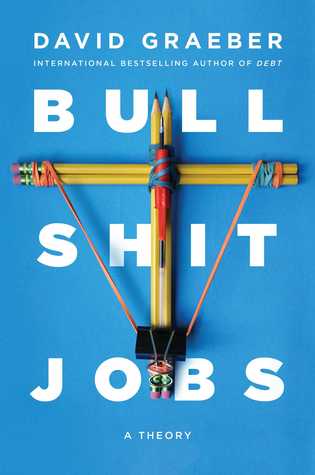Book Notes: Bullshit Jobs
Bullshit Jobs
by David Graeber
Read
Oct 9, 2021 -
Nov 25, 2021
⭐⭐⭐⭐⭐
Bullshit Jobs illuminates the baffling amounts of unnecessary make-work in modern workplaces. It helped me get a better view on managerial bureaucracies, and especially the category of work that Graeber calls “box-ticking” (the primary form of bullshit work I’ve encountered in my mostly-not-bullshit occupation).
Graeber’s definition of “bullshit job” is refreshingly humane and empowering: a job is a bullshit job if the person doing it believes it to be so. He theorizes that many of these jobs have proliferated in the last 50 years largely because there isn’t that much “productive” work to do for everyone, yet our culture demands that we have a job to be able to live. The book also addresses counterarguments such as “workers don’t see the whole picture” and “the market wouldn’t pay for these jobs if they were pointless.”
Although the subject is depressing (so much life wasted on a bizarre pursuit to prove we’re worth of making a living!), there are some ideas towards the end of the book on how we might improve the situation. It won’t be easy, since it would require a gradual change away from the Western anglo-inflected culture of work-as-moral-obligation and suffering-as-virtue.
The book is broad-ranging, tying the concept of bullshit jobs to topics like the underpayment of teachers and others in non-bullshit occupations, or the proliferation of the non-profit industrial complex. Lots to think about.
Book Highlights
But ultimately, the need to play a game of make-believe not of one’s own making, a game that exists only as a form of power imposed on you, is inherently demoralizing.
[…] corporations are less and less about making, building, fixing, or maintaining things and more and more about political processes of appropriating, distributing, and allocating money and resources.
Managerialism has become the pretext for creating a new covert form of feudalism, where wealth and position are allocated not on economic but political grounds—or rather, where every day it’s more difficult to tell the difference between what can be considered “economic” and what is “political.”
it’s not just the senselessness of the process that rankles, but as with all box-ticking rituals, the fact that one ends up spending so much more time pitching, assessing, monitoring, and arguing about what one does than one spends actually doing it.
It is increasingly a system of rent extraction where the internal logic—the system’s “laws of motion,” as the Marxists like to say—are profoundly different from capitalism, since economic and political imperatives have come to largely merge.
the whole apparatus, rather than replacing old-fashioned industrial capitalism, is instead superimposed on top of it, blending together in a thousand points in a thousand different ways.
To a large degree, needs are just other people’s expectations.
In most of the testimonies I collected, “meaningful” was just a synonym for “helpful,” and “valuable,” for “beneficial.”
The fact that servants were paid is crucial because it meant that while wage labor did exist in Northern Europe, centuries before the dawn of capitalism, almost everyone in the Middle Ages assumed that it was something respectable people engaged in only in the first phase of their working life.
“producerism” […] focus on “production”—a concept which, as earlier noted, is basically theological, and bears in it a profound patriarchal bias
It is a recognition that the world we inhabit is something we made, collectively, as a society, and therefore, that we could also have made differently.
We can all imagine a better world. Why can’t we just create one?
caring for others, especially over the long term, requires maintaining a world that’s relatively predictable as the grounds on which caring can take place.
The more the economy becomes a matter of the mere distribution of loot, the more inefficiency and unnecessary chains of command actually make sense, since these are the forms of organization best suited to soaking up as much of that loot as possible.
Tags: books
